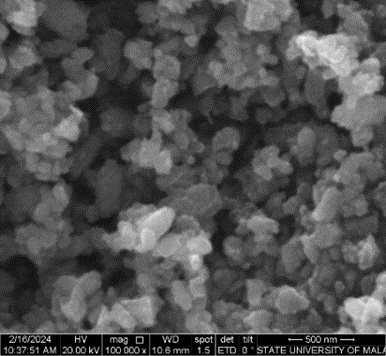Fabrication of Carbon Paste Electrode Modified with ZnO Nanoparticles and Nanobentonite for Analysis of Bisphenol A by Cyclic Voltammetric
Abstract
The Bisphenol A (BPA) is a 2,2-bis(4-hydroxyphenyl) propane compound that is produced on a large scale for industrial applications, particularly in polycarbonate plastics. BPA molecules can migrate from plastics into food if stored at high temperatures and for extended periods. Various methods have been developed for BPA analysis, including cyclic voltammetry. This study focuses on the fabrication and application of a carbon paste electrode (CPE) modified with ZnO nanoparticles and nanobentonite for the analysis of BPA in polycarbonate-based bottled drinking water using cyclic voltammetry. The results showed that the optimal electrode conditions were: electrode composition 3:4:1:2 (carbon: nanobentonite: ZnO nanoparticles: paraffin), and pH 7. The BPA content obtained by cyclic voltammetry for brands A, B, and C was 0.2102; 0.1752; and 0.2210 mM. These results demonstrate that cyclic voltammetry with a ZnO nanoparticle and nanobentonite modified carbon paste electrode can be used for BPA analysis.
Downloads

Copyright (c) 2024 Andini Febriyana, Pirim Setiarso

This work is licensed under a Creative Commons Attribution-NonCommercial-NoDerivatives 4.0 International License.
Authors who publish with this journal agree to the following terms:
- Copyright on any article is retained by the author(s).
- The author grants the journal, the right of first publication with the work simultaneously licensed under a Creative Commons Attribution License that allows others to share the work with an acknowledgment of the work’s authorship and initial publication in this journal.
- Authors are able to enter into separate, additional contractual arrangements for the non-exclusive distribution of the journal’s published version of the work (e.g., post it to an institutional repository or publish it in a book), with an acknowledgment of its initial publication in this journal.
- Authors are permitted and encouraged to post their work online (e.g., in institutional repositories or on their website) prior to and during the submission process, as it can lead to productive exchanges, as well as earlier and greater citation of published work.
- The article and any associated published material is distributed under the Creative Commons Attribution-NonCommercial-NoDerivatives 4.0 International License.





_copy1.png)










